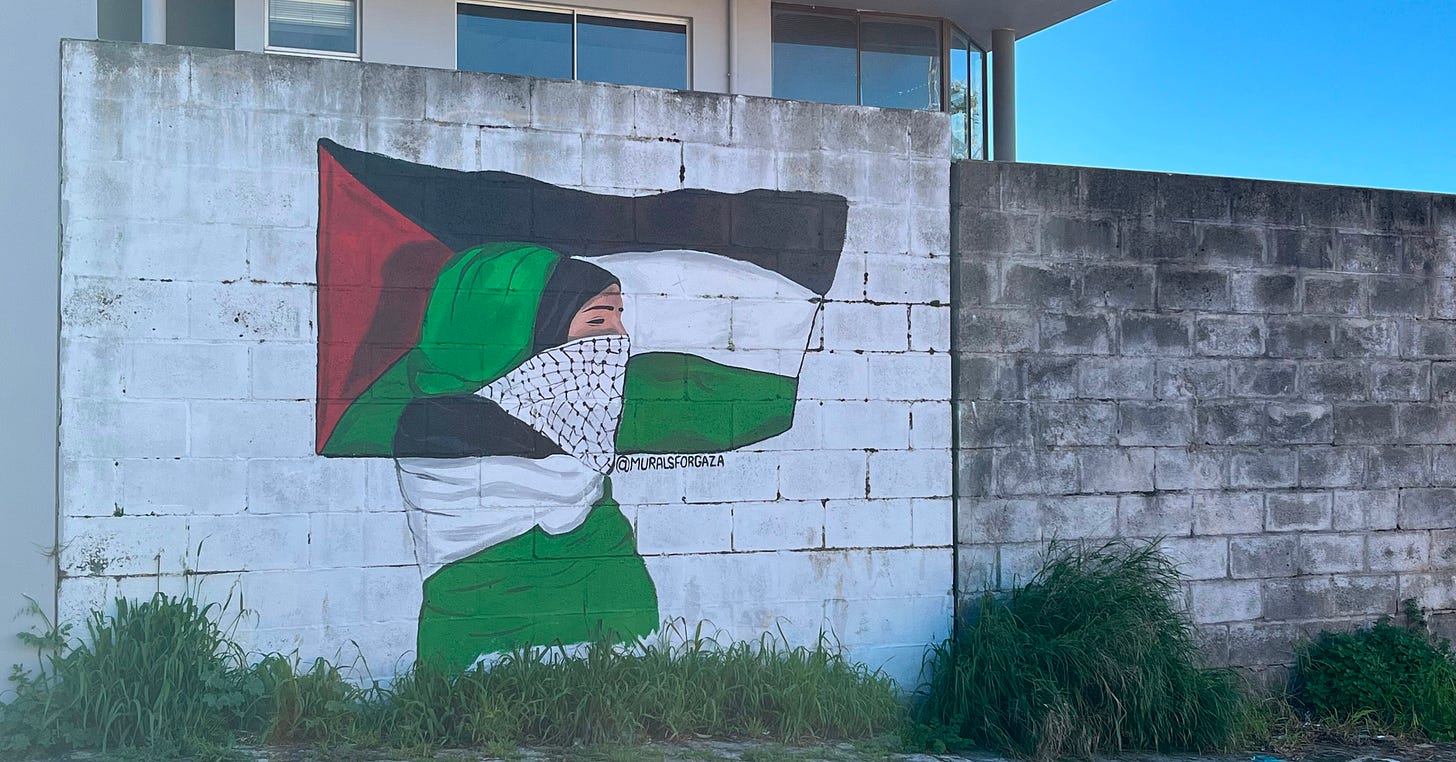Nakba Then, Nakba Now: It is Year 77
Jehan Bseiso reads her poem “Bint Nakba” and we share a video from our New York City event last year where over 20 writers and artists came together in solidarity with Palestine.
This week marks 77 years of the Nakba which memorializes the devastation of the Palestinian homeland in 1948 through ethnic cleansing and expulsion of a majority of Palestinian people. The Nakba, or the Catastrophe, is commemorated on May 15th of each year through demonstrations, strikes, protests and by reciting the names of over 500 villages that were uprooted or destroyed. Nakba day is about resisting expulsion and erasure.
Since October 7th, 2023, over 70,000 Palestinians have been killed and this is a modest estimate. Thousand remain trapped under the rubble and over hundreds of thousand are severely injured. Around 10,000 Palestinians have been kidnapped and imprisoned without charges , many of these are children, and many of them are enduring torture and all denied any legal recourse. They are hostages in the most accurate definition of the word. Israel’s severe blockade on food and humanitarian supplies as well as relentless bombing has induced famine in Gaza. 1 out 5 people are starving. This is genocide in the most accurate definition of the word.
Today, we continue to witness another Nakba. It is imperative that the world rises up on every continent. Palestinians are calling for Global Day of Action through mass mobilizations and civil disobedience.
We have solemn yet empowering offerings to commemorate Nakba day and to stand in solidarity with all Palestinians. Jehan Bseiso reads her poem “Bint Nakba” (daughter of the Nakba) which was written seven years ago to commemorate the 70th year of the Nakba back in 2018. It may as well have been written today.
And we wanted to bring your attention to an event Nakba Then and Now: Refuse Silence that we co-hosted last year in New York City where over 20 artists and writers convened to raise their voice and amplify the Palestinian struggle for freedom.
Bint Nakba
by Jehan Bseiso
For Mohammed El Dura who died in his father’s arms in Gaza, in front of the whole world.
And don’t ever forget it, my grandfather warned me.
“Nakba’s daughter”, one among millions dispossessed.
This time last year I was a guest at home(land).
For hours,
Waiting, for permission and approval,
For the “private security company” to give me back my passport.
Wishing, I could walk through the metal gate, rip the barbed wire with two hands.
Beyond the entitled occupiers with their big guns and yellow smiles.
Something about May in Palestine is all waiting and loss.
In Ramallah, streets were covered with slogans and banners declaring:
“we have the right to return”
Could a march to Palestine begin from Palestine?
I think of all the cities I can hold in one breath
Inhale: Amman, Beirut, Cairo.
Exhale: All the layers of refuge and return.
In Hebron, I asked a shop keeper: How far?
He said: Gaza is as far as all these checkpoints,
armed settlers
and years of siege.
In Amman, I am holding two photos in my hands.
In this one the sea is black and white, Jido and his friend look at the camera wet and grinning.
(1929, Gaza)
Older in a leather jacket, standing alone at the beach. Silver hair perfectly parted.
(1994, Gaza)
The border is a frontline where thousands march for their right to exist and resist.
A doctor explains: The snipers target the back of the knee, to force amputation.
And If we lose our legs?
we will crawl,
on our hands and elbows.
(2018, Gaza)
Something about the end of occupation and apartheid in my lifetime.
Originally published at The Psychoanalytic Activist here.
Last year on May 15, 2024, we co-organized a night of readings to commemorate 76 years of the Nakba and to stand in solidarity with Palestine with The Polis Project and The People’s Forum in New York. “Nakba Then and Now: Refuse Silence” invited everyone to raise their voice and amplify the Palestinian struggle for freedom.
There were readings by Aidah Masoud, Ibtisam Azem, Najla Said, Huda Fakhredinne, Maaza Mengiste, Valérie Gruhn, Mona Eltahawy, Sean Jacobs, Emna Zghal, Suha Araj, Mukoma wa Ngugi, Christina Dhanuja, Zohra Saed, Christopher Stone, Suneela Mubayi, Hafsa Kanjwal, Omar Berrada, Anna Arabindan Kesson, Jee Leong Koh, Anthony Alessandrini and Siddhartha Deb.
“Freedom Dance” was composed & performed by Kesivan Naidoo




Yes, when the capital of the Arab countries becomes a place of entertainment for Mr. Trump, that is, a green light for mercenaries to commit Israeli crimes: Kill as much as you can, it doesn't matter,
Kill, it's no different from hunger, famine, or bullets.
just give our palaces and harems their share of the oil and gas wells in southern Gaza.
Where does the problem come from? The childish wisdom of the American people who elected a Cabaret owner as president, or from the people of the Middle East who are not moving to free themselves and Gaza from their puppets?